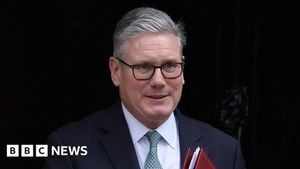Omar García Harfuch, the head of Mexico's Secretariat of Security and Citizen Protection (SSPC), provided updates on the government's aggressive strategy against the Sinaloa Cartel and, more prominently, the faction known as Los Chapitos. During his address at the morning conference led by President Claudia Sheinbaum Pardo, Harfuch emphasized recent law enforcement achievements aimed at dismantling this notorious criminal group.
According to Harfuch, the efforts to weaken Los Chapitos have led to over 900 arrests across Sinaloa since October. He stated, "The strategy against Los Chapitos, Los Mayos, and other groups began last October and has yielded results, as they are priorities for the Mexican government." These operations have been characterized by targeted actions, including high-profile captures such as Gustavo "N", known as "El Güerito", and Kevin Alonso "N", alias "El 200"—both key collaborators of Iván Archivaldo Guzmán Salazar, the son of the infamous Joaquín "El Chapo" Guzmán.
Sparking questions during the conference, García Harfuch addressed concerns about the alleged escape of Guzmán Salazar via underground tunnels. He firmly denied these allegations, asserting, "The operations aimed at detaining El Güerito and El 200 were focused solely on these two targets." Notably, he clarified, "There was no tunnel involved. It is common for houses in Sinaloa to have these structures since years ago." This comment reflects the challenges law enforcement faces dealing with the entrenched criminal infrastructure.
García Harfuch noted the consistent nature of operations, stating, "More than just being close or far, it is about continuously weakening the criminal structures so they do not generate violence." His insights illustrated the urgency of combating the spikes of fierce violence associated with the drug wars, which have deeply affected the region and the daily lives of its citizens.
The SSPC head shared information from recent conversations with U.S. officials, detailing cooperative efforts to combat organized crime and share intelligence. He remarked, "Information about criminal organizations has been shared and received, enhancing collaboration between the U.S. and Mexico to dismantle these groups." This security dialogue highlights the international commitment to tackling drug trafficking and violence.
Elucidation on operational tactics shed light on the recent discovery of properties connected by tunnels. Harfuch remarked, "Many houses are located with tunnels or escape routes for criminals. Our efforts with the Attorney General’s Office aim to secure these properties continually." Such statements reinforce the challenges posed by the Sinaloa Cartel, known for its ability to adapt and evade capture through innovative escape routes.
Recent findings, particularly the capture of significant figures within the cartel, are being framed as victories against Los Chapitos. The arrests contribute to the broader narrative of increased security and reduction of violence across Sinaloa. García Harfuch highlighted the importance of not only tracking down prominent figures but also dismantling their supply chains and financial networks, stating, "We have seized over 39 tons of various drugs and dismantled 50 labs, showcasing our commitment to curbing cartel operations." This statistic alone underlines the scale of the fight against such organized crime syndicates.
Throughout his address, attention was drawn to the social repercussions of cartel violence, particularly its effects on children and families within the state. García Harfuch expressed concern over the recent increase of minors falling victim to such violence, stating, "These tragedies are caused by organized crime members. It's important to recognize the significant distress these groups inflict on families and communities." This statement resonates with recent tragic events involving the loss of children, prompting greater public scrutiny of cartel impact.
Despite the tribulations, the secretary reassured the public about the consistent presence of the National Guard within educational facilities, emphasizing, "Since the current administration's onset, the National Guard has maintained vigilance across schools, resulting in no violent incidents reported." This step not only aims to protect students but also reflects the government's proactive approach to fostering safer communities.
García Harfuch concluded the briefing with insights on the health of Nemesio Oceguera Cervantes, leader of the Jalisco New Generation Cartel (CJNG), stating, "We currently have no new information, only what is known about the renal deficiency he’s facing." This comment reiterates the authorities' continuous effort to monitor criminal kingpins and their operations.
With coordinated operations and substantial arrests, the Mexican government, under the leadership of García Harfuch, persists confrontily against cartels, seeking to restore peace and safety to communities ravaged by drug-related violence. While public concerns remain, the integration of U.S. cooperation and continued pressure on cartel structures illuminates paths toward effectiveness against organized crime.



